
Updated on: December 20, 2024
Short on time? Here’s the best VPN for China in 2025:
- 🥇 ExpressVPN : CyberGhost VPN isn’t good for China, so I recommend ExpressVPN — it includes reliable obfuscation tools to hide your VPN traffic in China and maintains blazing-fast speeds. You get industry-leading security and privacy features to protect your online activities from the government and any third parties, and it’s very easy to use. All plans are backed by a 30-day money-back guarantee, so you can try it out risk-free.
CyberGhost VPN doesn’t work in China, and there are no troubleshooting steps to make it work. This is because the VPN doesn’t offer obfuscation, an essential feature that hides VPN traffic.
There are very few VPNs that work in China, but I found great alternatives that do. My top recommendation is ExpressVPN, which has top-notch obfuscation that gets around government censorship, maintains super-fast speeds for all online activities (even with obfuscation enabled), and provides best-in-class security and privacy features to protect your online traffic from Chinese ISPs (Internet Service Providers) and the government.
Editor’s Note: Due to China’s censorship, VPN performance can be inconsistent, with occasional disruptions. ExpressVPN is typically dependable and offers a 30-day money-back guarantee for first-time users. Using unauthorized VPNs in China is against the law. No known cases of foreigners being penalized for VPN use exist, but I recommend being cautious about using a VPN in China. This guidance is not an endorsement of using VPNs for illegal activities.
Editors' Note: ExpressVPN and this site are in the same ownership group.
How to Use a VPN in China
- Choose a reliable VPN that works in China. My top recommendation is ExpressVPN because it offers the fastest speeds with obfuscation enabled.

- Download and install the VPN app. You can download the VPN app from the vendor’s official website or from your app store. It’s best to do this before traveling to China, as the government blocks most VPN sites and apps. If you’re already there, you should reach out to your VPN provider’s customer support and ask for a mirror link.

- Open the VPN app and connect to a server. Navigate through the server list and choose a server. For optimal speeds, select a server location near China, such as Hong Kong or Taiwan. Keep in mind that ExpressVPN automatically enables obfuscation, but with most other VPNs, you’ll first have to manually enable the obfuscation feature and then connect to a server so the VPN can work in China.

- Browse the internet freely. Once connected, you can safely and securely browse the internet without restrictions while in China.
Best VPNs That Still Work in China in 2025
Quick summary of the best VPNs that still work in China in 2025:
- 1. 🥇ExpressVPN — Best VPN for China (blazing-fast speeds + obfuscation on all servers).
- 2. 🥈Private Internet Access — Excellent secure VPN for China with customizable apps.
- 3. 🥉PrivateVPN — Beginner-friendly VPN with a simple obfuscation tool.
Editors' Note: Intego, Private Internet Access, CyberGhost and ExpressVPN are owned by Kape Technologies, our parent company
🥇1. ExpressVPN — Best VPN for China in 2025
ExpressVPN is my #1 recommendation for China. Its obfuscation feature disguises your VPN traffic to look like regular traffic. This makes it harder for Chinese censors to detect and block it.
I really like how the VPN supports obfuscation on all servers in 105 countries, meaning you can connect to any server location in China. It also offers obfuscation on all protocols, but its support reps told me to use the Automatic protocol setting in China for the best results.
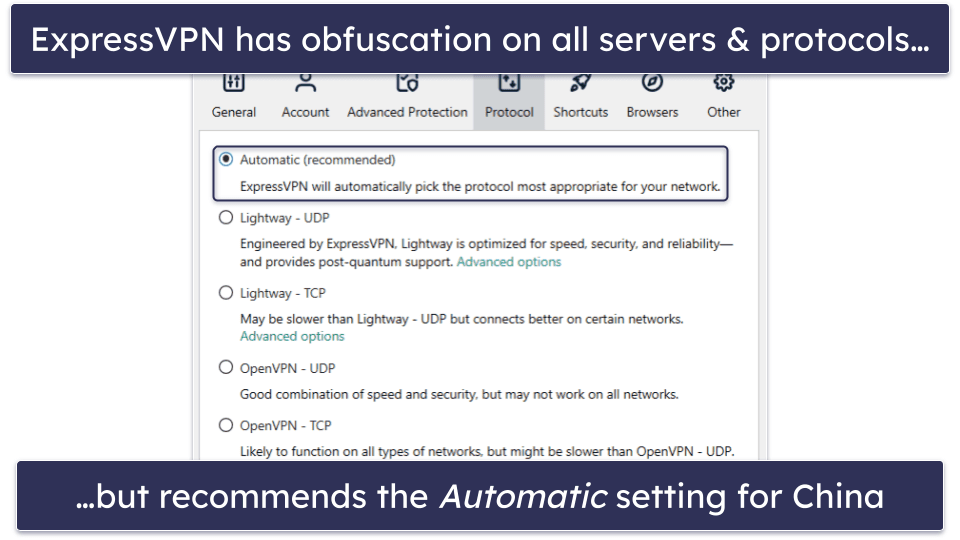
I really like how ExpressVPN is super fast, even with obfuscation. This makes it a great pick for all online activities in China, such as streaming. It can access 100+ streaming services, including several Netflix, Max, and Disney+ libraries.
ExpressVPN uses mirror links, in case you’re unable to access its official site from China. These links use different URLs to take you to the ExpressVPN site, so you can download the VPN onto your device. If you need a mirror link, just email ExpressVPN’s customer support team — all reps I talked to were very knowledgeable about using the VPN in China and quick to respond.
I like ExpressVPN’s split-tunneling feature, which lets you choose which apps use the VPN connection and which use your regular connection. It’s useful if you only want to use the VPN for specific apps. For example, you can route a social media app through the VPN but browse a local app through your primary network.
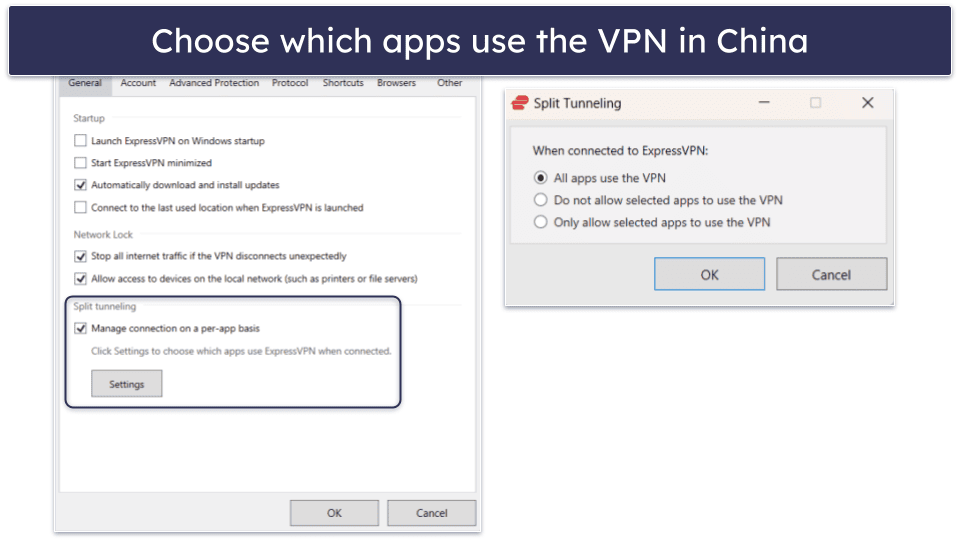
ExpressVPN’s plans start at $4.99 / month, and it’s worth it because this is the best VPN on the market. Plus, it backs all purchases with a 30-day money-back guarantee, so you can test it out risk-free.
Bottom Line:
ExpressVPN is my #1 VPN pick for China in 2025, as it as it can bypass censorship in restrictive countries, has lightning-fast speeds over obfuscated traffic, and plenty of server locations near China for the best possible speeds. All plans come with a 30-day money-back guarantee.
Read the full ExpressVPN review
🥈2. Private Internet Access — Customizable Connections for China
Private Internet Access (PIA) works in China thanks to Shadowsocks proxy servers — these servers obfuscate your traffic and allow you to connect to servers in countries that don’t restrict the internet.
PIA’s proxy servers are located in 6 privacy-friendly countries, including the US, Canada, Japan, the UK, Switzerland, and the Netherlands. They’re easy to find (under Multi-Hop in Settings) and connect to, but ExpressVPN is even easier — it automatically enables obfuscation and on every server.
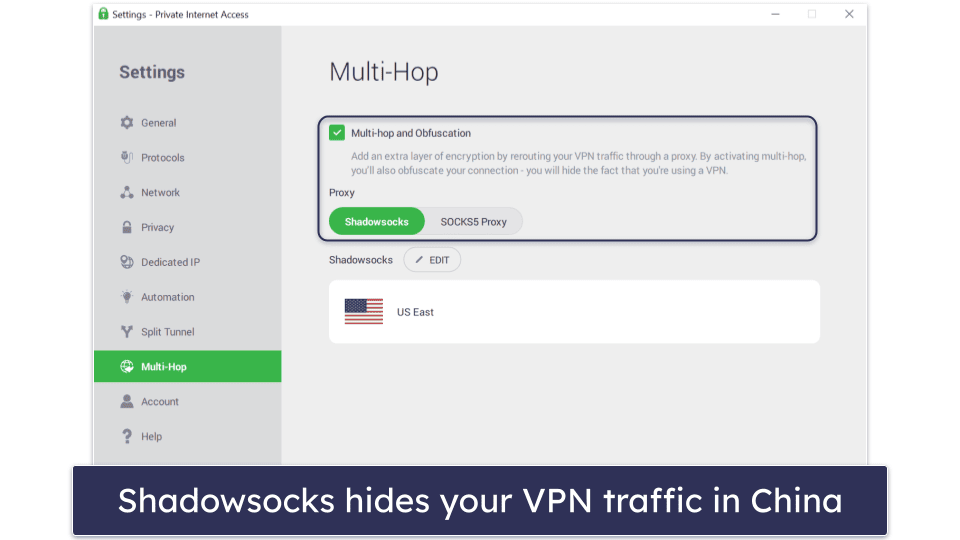
It’s very convenient how PIA allows you to customize your connections for stability and performance in China. Apart from using its Shadowsocks servers, you can also bypass censorship in the country by manually selecting the OpenVPN TCP protocol and using port 443, which Chinese authorities can’t block because it’s vital for secure HTTPS traffic. This way, you can connect to any of its servers in 91 countries.
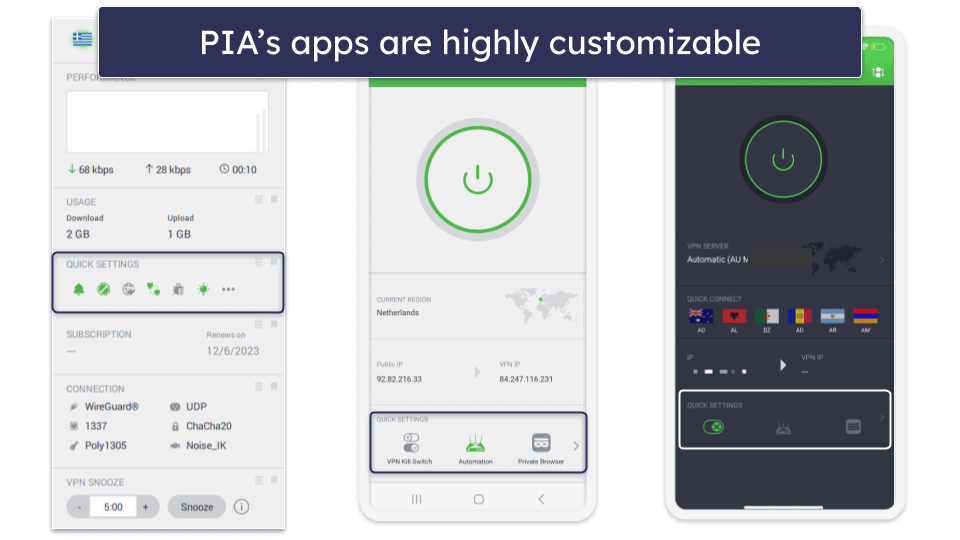
I’m a huge fan of PIA’s advanced split-tunneling that lets you split-tunnel both apps and sites. This way, you don’t have to exclude your entire browser when you need the VPN for a select number of sites.
PIA’s plans are very affordable, starting at $2.03 / month. It backs all subscriptions with a 30-day money-back guarantee.
Bottom Line:
Private Internet Access allows for lots of customization in China. It lets you tailor your VPN connection and also provides obfuscation via Shadowsocks proxy servers. It backs all plans with a 30-day money-back guarantee.
Read the full Private Internet Access review
Editors' Note: Private Internet Access and this site are in the same ownership group.
🥉3. PrivateVPN — Beginner-Friendly VPN for China
PrivateVPN’s easy-to-use interface is great for people who have never used a VPN. Its Stealth Mode feature obfuscates your traffic in China, and it’s very simple to enable — all you have to do is toggle the Stealth Mode switch in the settings. You can also choose port 443 to improve the chances of the VPN working with China’s Great Firewall.
With servers in 63 countries, PrivateVPN has a smaller server network than ExpressVPN and Private Internet Access, but PrivateVPN still covers several locations near mainland China, including Hong Kong, Taiwan, Vietnam, Thailand, Malaysia, and South Korea.
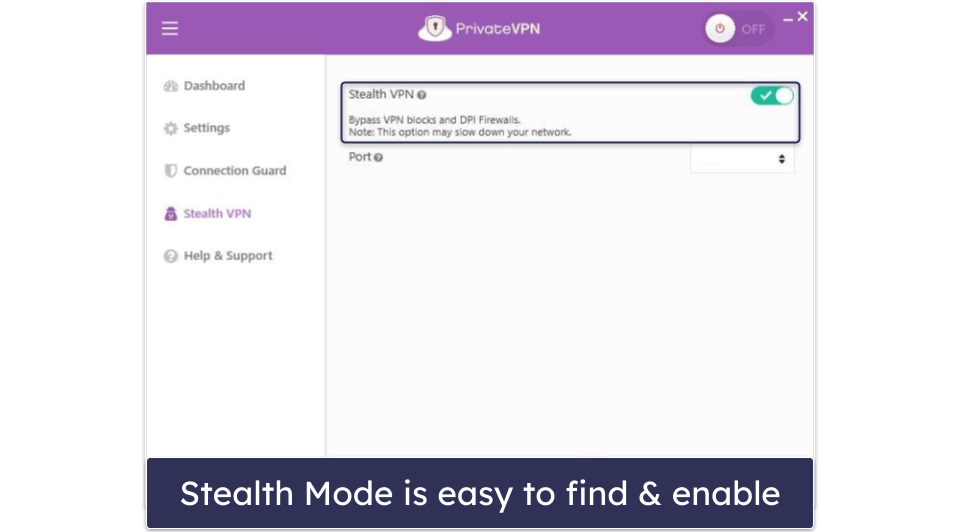
Its apps are very intuitive and offer simple explanations for all features. I especially like how it lets you choose between Simple View and Advanced View. The former is perfect for beginners as it displays minimal options and lets you easily connect to the VPN, while the latter offers more advanced options and allows you to customize the settings.
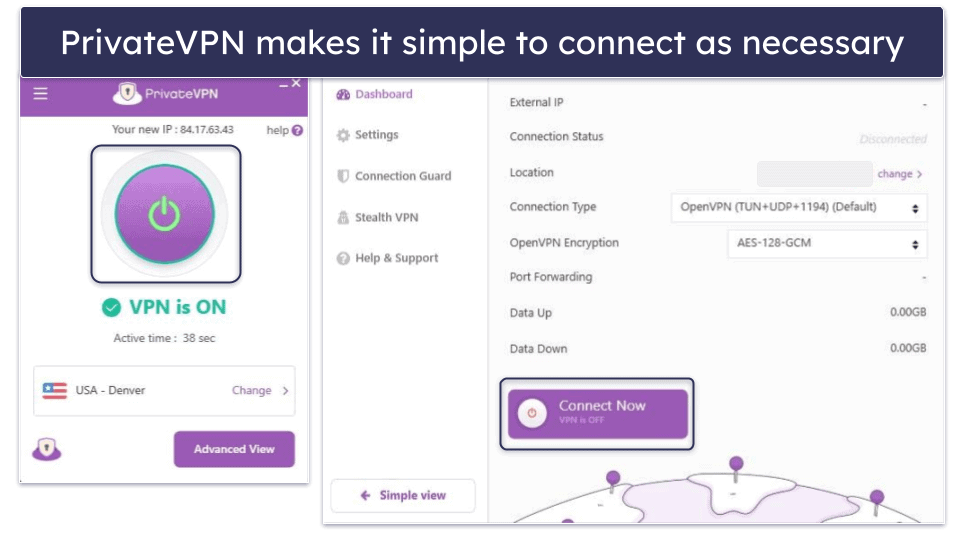
I also really like Application Guard, which is an advanced kill switch that disconnects certain apps when your connection to the VPN server drops.
PrivateVPN offers very competitive pricing plans (starting at $2.00 / month), and covers all plans with a 30-day money-back guarantee.
Bottom Line:
PrivateVPN is a beginner-friendly VPN for China. Its minimalistic apps make it very easy to enable obfuscation, and you get good server coverage — you can connect any server over obfuscation. PrivateVPN has a 30-day money-back guarantee included with all of its plans.
Read the full PrivateVPN review
Quick Comparison Table
Editors' Note: Intego, Private Internet Access, CyberGhost and ExpressVPN are owned by Kape Technologies, our parent company
Testing Methodology: Comparison & Ranking Criteria
I followed our proven testing methodology to ensure the recommended VPNs work in China by testing accessibility, speed, ease of use, and more. Here’s how I dedicated what VPNs to include and rank:
- I ensured the VPN works in China. The Chinese government actively blocks unauthorized VPNs and VPN traffic. The VPNs on this list offer obfuscation that gets around censorship in restrictive countries.

- I prioritized strong security. All recommended VPNs offer industry-leading security features, including military-grade 256-bit AES encryption to protect your privacy in China and prevent keyword and website blocking. They also feature a kill switch to avoid data exposure if your connection drops and maintain strict no-logs policies to ensure no data is shared with the Chinese government.
- I tested each VPN’s speeds. VPNs inherently slow down your connection due to encryption, and obfuscation, which a VPN needs to be able to work in China further reduces speeds. I ran speed tests with obfuscation on and made sure you can browse the web without too much slowdown. ExpressVPN consistently provided the fastest speeds.

- I checked for app compatibility and ease of use. Each VPN offers apps for major operating systems, including Android, iOS, Windows, and macOS. These apps are user-friendly, requiring just a few clicks to enable obfuscation and connect to a preferred server.
- I confirmed excellent value. I recommend VPNs that offer extra features like split-tunneling and a money-back guarantee, allowing you to try the service risk-free.
How to Download a VPN If You’re Already in China
Chances are, you won’t be able to access your VPN’s official site to download the app if you’re already in China. The good news is there are plenty of workarounds:
- Use a mirror website. Many VPNs have mirror websites with different URLs that they regularly change to make sure the Chinese government hasn’t blocked them. To get a link to your provider’s mirror website, just reach out to its customer support via email.
- Use a free web proxy. A proxy temporarily changes your IP address (without encrypting data). This way, you can just type in your provider’s website into the search field.
- Use your SIM card. If the SIM card from your home country supports roaming, you may be able to use it to visit your provider’s website.
- Get help from a friend abroad. Reach out to a friend that’s outside of China and ask them to buy a subscription for you. They can then email you the installation files and login details.
- If you use Android, ask the support reps for the .apk installation files. Once you receive them, you’ll simply need to open and install them, without having to go to your provider’s website.
- Consider a trip to Hong Kong or Macau. Although these regions aren’t 100% free of Chinese surveillance, they’re outside China’s Great Firewall, so you should be able to visit your provider’s website from there.
Frequently Asked Questions
Why doesn’t CyberGhost VPN work in China?
The Chinese government uses advanced technology to detect and block unauthorized internet traffic, including VPNs that aren’t approved by the government. For a VPN to be approved for use in China, the provider has to agree to share data with the Chinese government, which defeats the purpose of using a VPN in the first place.
This is why a lot of VPNs, including CyberGhost VPN, no longer work in China. The very few that do, like the VPNs on this list, use obfuscation to hide VPN traffic. Please note that it may be illegal to use a VPN in China — I recommend following all the local rules and regulations.
Why do I need a VPN in China?
Many websites that are available outside of China are unreachable through Chinese internet services because the government regulates internet access. All the VPNs on my list have obfuscation features, which mask VPN traffic as normal traffic, allowing you to connect to a server in another country. In addition, a VPN encrypts your traffic so it’s unreadable by third parties.
Is CyberGhost VPN legal in China?
CyberGhost VPN isn’t a government-approved VPN in China, so it may be illegal to use it. China only approves VPNs that agree to share user data with the government and CyberGhost VPN isn’t one of them. I haven’t found any instances where the government legally took legal steps against tourists for using a VPN, but I recommend caution.
What’s more, CyberGhost doesn’t really work in China, so if you really need a good VPN for China, check out my best VPN picks for China here.
Which VPNs still work in China?
There are only a few independent VPNs that work in China. The providers I recommend use obfuscation to hide your VPN traffic and good security features, so you can safely browse the web in China.

